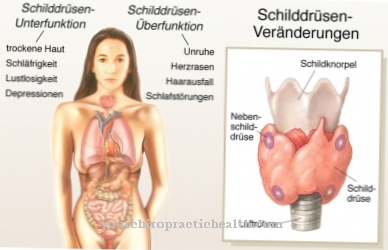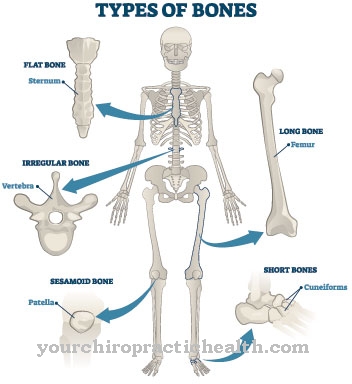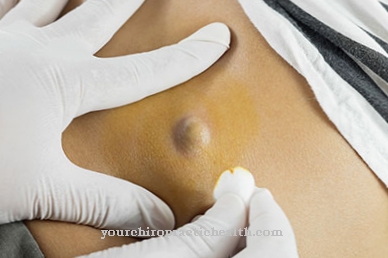A Inflammation of the lining of the stomach (gastritis), also Gastric catarrh, is a disease of the lining of the stomach. In the course of the disease, inflammation develops within the stomach. Elderly people in particular suffer from gastritis. The gastric mucosal inflammation can occur both acutely and chronically.
What is an inflammation of the stomach lining (gastritis)?
.jpg)
© designua - stock.adobe.com
The Inflammation of the stomach lining is also called in medical terminology gastritis denotes and describes inflammation of the lining of the stomach. It can be an acute illness that subsides, but it can also be a chronic condition. The most common symptom is moderate to severe abdominal pain, which often leads to misdiagnosis.
In some cases, the pain extends under the sternum, which is why the heart is often suspected as the trigger. It is typical that the symptoms get better for a short time after eating. Bloody vomiting, tarry stools and anemia are also typical symptoms. The chronic form is indicated by watery diarrhea, nausea and loss of appetite.
causes
The gastritis or. Inflammation of the stomach lining is divided into four types that describe the exact cause. The types A, B, C and R are known.
In the Type A gastritis it is an autoimmune disease. The acid-producing parietal cells are attacked and the pH value in the stomach increases. This also increases the production of gastrin and there is a risk of carcinoma formation.
The Type B gastritis results from a bacterial infection and is the most common form. The bacteria cause chronic stomach ulcers, which can lead to stomach cancer. Usually this form of gastritis is localized at the gastric outlet.
In the Type C gastritis it is a chemically caused disease. It can be caused by bile in the stomach, for example. Various medications such as painkillers, such as diclofenac, aspirin or ibuprofen, as well as antibiotics can be identified as triggers of such gastritis. In some cases, heavy alcohol consumption or the consumption of tobacco can also be identified as the cause.
The Type R gastritis rarely found in standard medical works. It describes gastritis caused by frequent heartburn. This causes irritation of the mucous membrane and, among other things, the known symptoms or other complications.
Typical symptoms & signs
An inflammation of the stomach lining typically manifests itself as pain and a strong burning sensation in the upper abdomen. These symptoms are accompanied by nausea, vomiting, and indigestion.
In acute gastritis, severe stomach and back pain occur, which are usually accompanied by tenderness in the stomach. In addition, there is an increasing loss of appetite or a feeling of fullness. In addition, gas and belching can occur. The symptoms are strongest after meals and usually appear in phases. Chronic gastritis is often completely symptom-free.
The symptoms develop gradually, often over the course of months or even years, and are only noticed late. Possible signs of a chronic inflammation of the gastric mucosa are unspecific symptoms in the upper abdomen, for example burning sensation and pain. Belching and a feeling of fullness after eating are characteristic.
The symptoms occur especially after eating difficult to digest food and subside after a few minutes. Gastritis cannot be seen externally at first. Weight loss can occur in the course of the disease, and patients often appear sickly and emaciated. The symptoms worsen if there is no treatment and, as the disease progresses, cause further diseases and disorders of the gastrointestinal tract.
Course of disease
The gastritis or. Inflammation of the stomach lining is initially associated with unspecific abdominal pain (stomach pain). These can stretch under the breastbone.
If it only stays that way, gastritis can go away on its own within a few days. In severe cases of the acute form, however, bloody vomiting, tarry stools or symptoms of anemia occur, which signal that a doctor's visit is due.
In the chronic form of gastritis, the symptoms are somewhat more moderate or not at all.
Watery diarrhea, nausea or loss of appetite occur, and often anemia as well.
The course of the disease is different in that the symptoms keep coming back. The time between them varies from person to person.
Complications
The possible complications of gastritis differ depending on the cause of the disease. For example, type A gastritis can lead to the formation of (mostly harmless and easily controllable) carcinomas. Transitions into gastric carcinoma are still possible.
In addition, the gastric mucosal cells are gradually decimated. The missing parietal cells result in a reduced absorption of vitamin B12, which can lead to a special form of anemia. The many subsequent symptoms (tiredness, digestive problems, tendency to collapse) increase the mortality rate immensely if no treatment is given.
Type B gastritis can cause ulcers, one percent of which is the stomach itself. Ulcers can also occur in the duodenum (five percent of cases). The risk of gastric cancer is considered to be increased. In a few cases, developing ulcers develop into tumors.
Blood disorders also occur. This can lead to a platelet deficiency, which is particularly dangerous in the event of injuries. Iron deficiency and its consequences also occur.
Type C gastritis can lead to complications due to frequent and violent bleeding, which are primarily due to blood loss and inflammation that is difficult to control. All forms of gastritis can develop into a chronic course. In addition, the frequency of heartburn increases the risk of a pathological change in the esophagus (Barrett's esophagus).
When should you go to the doctor?
If the person concerned suffers from persistent or increasing pain in the upper abdomen, he needs medical care. If you experience severe pain, cramps or a burning sensation in your stomach, you should see a doctor immediately. Nausea, vomiting, and disturbances within the digestive tract are signs of an abnormality that needs investigation and treatment. If there is a loss of appetite, a decrease in body weight, a feeling of fullness, repeated belching or flatulence, a doctor should be consulted.
If the person concerned assumes a protective posture and can no longer meet their daily obligations as usual, a visit to the doctor is necessary. The cause must be determined so that treatment can be initiated. If the symptoms increase immediately after eating, this is an indication of a health impairment. There is a need for action, as inflammation of the gastric mucosa often leads to a further deterioration in the general state of health in the following days.
A doctor is needed if there is pressure sensitivity in the upper abdomen or back problems. If there is a decline in performance, if you feel sick or if you experience a feeling of internal weakness, you should consult a doctor. Behavioral problems, irritability, the acute decrease in well-being are further symptoms that indicate an illness and should be assessed by a doctor.
Treatment & Therapy
The acute Inflammation of the lining of the stomach (gastritis) often disappears on its own within a few days or on the same day. If it lasts longer, drugs that inhibit gastric acid production are prescribed. If there is a bacterial infection, antibiotics are used. During the gastritis one should avoid alcohol, cigarettes and caffeine - when giving antibiotics also milk.
Chronic gastritis, such as type A, does not always need treatment. However, if bleeding does occur, it must be sealed during a gastroscopy or an operation. Medicines that slightly inhibit the production of gastric acid help against gastritis symptoms.
Outlook & forecast
The further development of an inflammation of the gastric mucous membranes is linked to the existing disease trigger of the cause. In the case of a bacterial infection, medical care usually provides significant relief within a few days or weeks. Recovery is usually achieved in about ten days. The patient can then be discharged from treatment without any symptoms. In the course of life, a new bacterial infection can occur, for which the prognosis is also favorable.
If the bacterial infection was triggered by a stomach ulcer or cancer, this cause must be healed so that the gastric mucosal inflammation also recedes. The earlier the tissue change is diagnosed and treated, the better the future prospects. At an advanced stage, a life-threatening condition can develop.
If you have an autoimmune disease, your outlook is worse. In most cases, lifelong medical therapy is necessary for improvement in health. However, the risk of developing cancer is increased in these patients. In the case of a chemically caused illness, the way of life has to be changed in most cases. Recovery is possible as soon as the irritant substances are no longer consumed. Therefore it is necessary to give up alcohol or tobacco in order to be free of symptoms.
Aftercare
The treatment and the further course depend strongly on the time of diagnosis, so that a general prediction is not always possible. Inflammation of the gastric mucosa can, in the worst case, be life-threatening, depending on the physical condition of the person affected. As a rule, regular visits to the attending physician are made in the case of gastric mucosal inflammation to clarify the healing process. Follow-up care is more like preventive treatment. Acidic and difficult to digest foods should be removed from the menu for the duration of the treatment; balanced meals and moderate exercise will stimulate the recovery process. Any complications can be identified and treated at an early stage. If the gastric mucosal inflammation persists and is not treated, it can lead to a loss of weight and permanent damage to the mucous membrane. In this case, the cause should be investigated more closely.
You can do that yourself
In the case of an inflammation of the gastric mucosa, some self-help measures and home remedies can be used. First, a change in eating habits is recommended. Sick people should especially eat alkaline foods such as steamed vegetables, whole grains, rice, fruit with little acid and nuts. It is important to avoid fatty foods and drinks as well as overly spicy, hot or cold foods. Very important: It is best to eat many small meals throughout the day and chew every bite well. You should also drink a lot. No alcohol or caffeine, however, but soothing teas or still water.
In addition to these dietary measures, a stomach treatment in the form of green tea, chamomile or ginger helps. Turmeric is an effective home remedy for inflammation of the stomach lining. Mallow leaves and natural yoghurt also have a positive effect on the stomach and intestines. One of the oldest home remedies for gastritis, however, is the roll cure, in which the sick person alternates between lying on his stomach and back after consuming a stomach-friendly food.
In addition, bed rest and rest is recommended. Physically strenuous activities should initially be avoided. It is better to cure the disease slowly and to go easy on the stomach. If the symptoms persist, you should see a doctor with inflammation of the gastric mucosa.


.jpg)

.jpg)








.jpg)

.jpg)
.jpg)











.jpg)